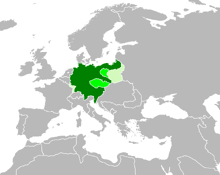| |||||||
| Capital | Berlin, Vienna | ||||||
| Largest city | Berlin | ||||||
| Other cities | Vienna, Munich, Königsberg, Frankfurt, etc. | ||||||
| Language official |
German | ||||||
| others | Danish, Polish, Frisian, Czech, Italian, Hungarian, Croation, etc. | ||||||
| Kaiser | Friedrich Wilhelm II | ||||||
| Royal house: | Hohenzollern (Currently) | ||||||
| Reichskanzler | Otto von Bismarck | ||||||
| Area | area km² | ||||||
| Population | population | ||||||
| Established | October 12, 1848 | ||||||
| Currency | Reichsmark | ||||||
The Empire of the German Nation (German: Reich Deutscher Nation, Polish: Imperium Narodu Niemieckiego, Czech: Říše německého národa) is the official successor state to the German Confederation, but in a larger political sense, the Kingdoms of Prussia and Austria. Formed out of German nationalism in the mid-1800's, the superstate finally unified the Germanic peoples under an elective constitutional monarchy, similar to that of the Holy Roman Empire's system of Prince-Electors combined with democratic and libertarian freedoms similar to both Britain and the United States.
The 1848 Revolutions:[]
- Main Article: 1848 Revolutions
Post-1848 Revolutions:[]
An Uneasy Unity:[]
Following the Revolutionary Wars and unification under the newly crowned Kaiser Friedrich Wilhelm I, it was clear that infighting was going to be prevalent, if at least in the beginning. Both Austria and Prussia were creating pacts and deals with the states of the Reich, and each had the unquestioned support of Bohemia and Poznań, respectively.
Prussia had managed to bring the northern states under its sphere, while Austria brought the southern ones into theirs. As tensions began to rise, it also became clear that the more liberal Prussia would be heading the country for a while, with both its König and Premierminister Otto von Bismarck as the two most powerful men in the nation. So, a comprumise was reached in early 1850 by both factions. Alfred I, Prince of Windisch-Grätz, was promoted to the rank of Kaiserlich Feldmarschall (Imperial Field Marshal), giving him direct control of the entire military, usurping Bismarck and second only to the Kaiser himself in military rank.
With a staunch conservative being given the highest German rank, many liberals cried indignantly, pointing out the scandalous backroom deal. In truth, it was one of the only ways Prussia was able to pacify the warhawks of the Austrian population, who were becoming uneasy under a perceived protestant takeover.
External Problems:[]
Similarly, the Democratic Hungarian Empire, reactionaries still wary of the Germans, used this as proof of an "empending invasion". Lajos Kossuth was persuaded by Artúr Görgey to listen to the militant politicians and soldiers, and began planning for an invasion of Ottoman-held Bosnia.
Not long afterward, Poznań grew to become another of the Reich's problems. "The Polish Question", as it had been called during the debates Frankfurt Parliament, had been tossed back-and-forth, with no real decision being decided upon. As a stand-off between Prussian and Polish soldiers earned world-wide headlines in June of 1850, It was clear that the time for debate was over. Bogusław Fryderyk Radziwiłł, the Duke-Governor of Poznań, met with a delegation of German officials headed by Otto von Bismarck. Both gained a reluctant respect of each other, and in a direct defiance of Russian rule, promised to help Poznań regain Western Poland, and in such an event, free it from Prussia to be elevated to the status of kingdom.
As Germany neared the 1860's, its future remained uncertain. Tensions with Hungary and Russia reached an all-time high, almost to the brink of war. Napoleon III's new French Empire was also becoming a threat, and an uneasy alliance with the United Kingdom was formed. Germany's only friend in the world was Italy, which dedicated itself to helping its ally where ever possible, with military protection guaranteed in return.
And all the while, storm clouds began brewing on the other side of the world, as the United States of America began to descend into Civil War...



